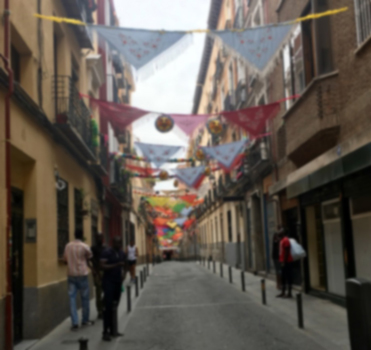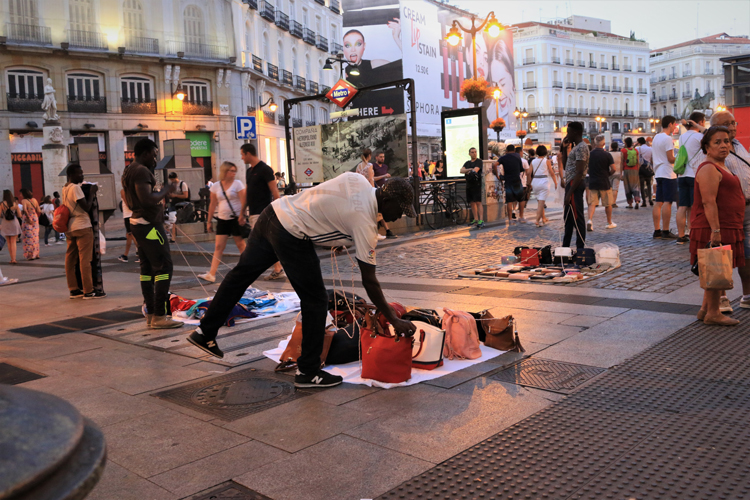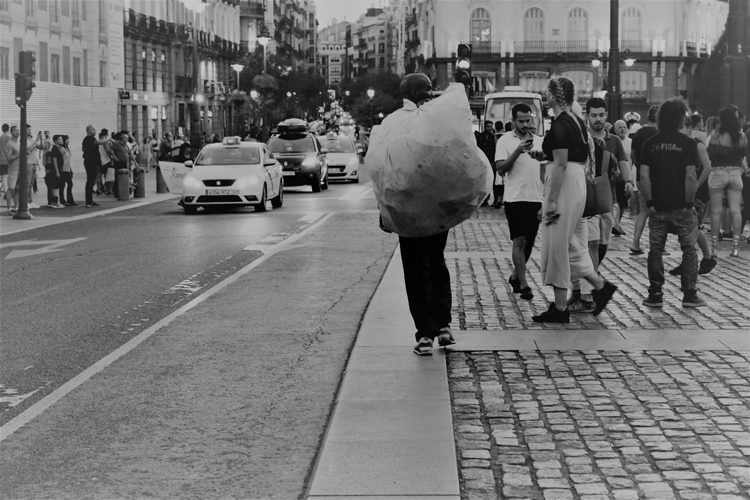Tall, dark and handsome is every woman’s go to description of an ideal man. You would think whoever that coined that phrase had the Manteros in mind.
The first time I ever saw Manteros was in El Retiro park on my very first evening in Madrid. The name is derived from the blankets they call their office. In Spanish manta is a blanket hence one who carries the blanket is a Mantero. The blanket is creatively made. With long strings on each corner that when folded turn into a makeshift bag very reminiscent of Santa’s bag. As hard as they are to miss, the men are simultaneously invisible to the general population. They are selling counterfeit bags, belts and branded football jerseys in a European city where people care about designer labels and authenticity. On top of that, their target consumers are a population that is historically very wary of big black men.
Senegal, a small west African country by the North Atlantic Ocean is what majority of the Manteros call home. A country that is very wealthy in terms of minerals such as gold and iron ore. Like any other African country’s story, Senegal’s is no different. Its natural resources’ cup is overflowing. Spain for instance has its vessels at this very moment on Senegalese waters fishing and will continue to do so till 2019 as per the Agreements the EU has done on its behalf with the Senegalese government. Yet and still, the sons of Dakar are fleeing home in droves to Spain in search of a “better” life.

Lavapies street | Grace Mwende
Lavapies is a very colourful and vibrant place. A little bit quieter than I had expected but it is August and life is slower during this month in Madrid with almost everyone away on vacation. It is quite obvious that this is a migrant majority neighbourhood with several international money transfer shops and the different ethnic restaurants present. There are Indian, Japanese and Senegalese restaurants just to name a few that are a walking distance from the metro. The buildings however have a Spanish feel and this is like the UN of neighbourhoods. Everyone is represented. Here is where I get to meet, interact and spend a beautiful summer day with the gentle giants of Senegal.
Aptly named, the Nelson Mandela plaza is where Fallou* (*I will use false fake names to preserve the anonymity of the subjects) and his friends spend their free time. As I walk up to this group of ten men I am surprised at how confident I feel. They are sitting on steps under a shadow from the next building shielding themselves from the scorching August summer sun and they are chatting in a language I assume to be Wolof because I cannot understand anything. I say hello to them and make sure I mention that I am Kenyan in an effort to build trust. With small talk out of the way I sit on the steps next to them and the conversation seamlessly flows in Spanish and English.
“I learnt English in Dakar as a second language while in college. I graduated with a science degree that is obviously not recognised here. Back home there is no work and I have to take care of my family. That’s why I had to come here” says Fallou as he eats a store-bought ice-cream cone. He is a tall, attractive, slender man who has this composed demeanour about him and smiles at the end of every sentence. The men around us are loudly chatting away in a French-Wolof conversation and it is a little bit hard to catch everything Fallou is telling me. I find myself inching in closer and closer as time goes by. It is getting hotter in the afternoon and more people are coming to sit on the steps and others are across us standing under a small tree staring in our general direction perhaps wondering who I am. There are two little children, a boy and a girl sitting next to a man who tells me he is their uncle and they are watching cartoons on his phone. I know I am sticking out like a sore thumb.
“I came to Spain on a ship”, says Fallou when I ask him what kind of visa he has. “I paid four hundred euros to get on the ship and it took a month from Dakar to here. We had a stopover at Tenerife and that is encouraging because you know you are halfway there. Once we arrived on the mainland in Spain, the people who got me on the ship housed me for two weeks and then after that I stayed with my friends” I am intrigued by this revelation and I have to ask the people around me how they got here. “Bateau” replies Serigne* French for ship. There are a few of them however who came to Spain by plane. “I have been in Spain for nine years in total. I have a lawyer who I gave a little something (money)and he helped me get papers because the law here says if you’ve been here for more than three years you can apply for the legal papers.”
As of August of this year, three times as many migrants had arrived in Spain compared to last year. Some even consider this a migrant crisis and even going as far as comparing Spain to Greece. This of course has not been taken kindly by the Spanish authorities. There have been numerous reports of police physically wounding the Manteros during their routine crackdowns in the plazas where the Manteros sell their merchandise. It is not uncommon to see Manteros selling their goods one minute and the next minute the entire stock is on the back as they are running from the police. It is as if they have a sixth sense but you can always see them on their phones perhaps talking to someone who tips them off. It is interesting to note how everyone else in the plaza is considered a street artist and makes money off it but the Manteros are considered illegal and are hunted down.

Manteros working in Puerta de sol | Grace Mwende
“On an average day, I sell maybe two or three bags, each costing fifteen euros. Some days more other days less. It really depends on the police and the weather” says Fallou as he gets up to get a cigarette from his friend. He does not smoke it and I am relieved at that small act of consideration. He is constantly interrupted by older men who greet him in a handshake that starts off like a normal handshake and ends as a tap on the forehead. I ask why and I am told it is a sign of respect. Oddly enough he is the only one in the group being greeted like that. One of the men, Morjor* comes next to me and he is smoking a cigarette and I motion my hand to ward off the smoke. “You don’t like cigarettes?” he asks me. “No, I don’t want to die. Do you want to die?” I jokingly reply because I don’t think he would understand me if I simply answered “cancer sticks” His reply throws me off. “Yes, yes I want to die. There is no money here, too many problems.” Replies Morjor while laughing with his friends who find his reply very comical. I am shocked
A very young-looking man is sitting quietly by the corner with super glue on one hand and Michael Kors tags on the other. He has a few bags on the ground and he is labelling them by sticking them on to the bags so they look like actual Michael Kors bags if you didn’t know any better. Later I try to talk to him but he is very shy. Next to him is a very well-dressed man who is engaging in the group conversation and in his hand, is the red iPhone 7. I ask Fallou who he is and he tells me he is one of the people who supplies the bags to him. I ask him where the bags come from. “I don’t know” he replies with a hearty laugh. “If I did, I would go there and get them for a cheaper price than I do here.” We both speculate China or Thailand.
“I used to work In Barcelona before I came to Madrid. I was a hotel cleaner but once my contract ended it was not renewed and I had to find another way of making money. I have family back home that I need to provide for. I decided to come to Madrid to find something else to do but it is hard to find a job here so for the time being I sell bags” he answers when I ask about his work history. “Do you want to stay here forever?” I ask. He quickly shakes his head and he answers with a sly laugh “No, I definitely want to go back home. I miss my family but the tickets to Dakar are not cheap. They cost 700 euros and I could send that money back home instead of buying a plane ticket.” Before I know it, the interview has been turned around on me. “How much did you pay for your ticket from Kenya?” He asks me. I dance around the question and say something about my school sponsoring me so I don’t exactly know. The truth is far from that but this is not about me.
The people are slowly getting up and leaving the steps and I ask where they are going. “It is cooler now. We have to go eat and prepare for the evening sales. Today was very tough. It is a holiday and there are so many police in Plaza del Sol where we work.” I want to hear more about his daily routine. “I wake up at seven o’clock, get ready and at around ten I leave for Plaza de Sol where I sell my bags till one o’clock. By this time, it is very hot and the police are looking for us and so I come here to plaza Nelson Mandela and hang out with my friends, smoke some cigarettes and enjoy good company till four o’clock. We then go to eat and prepare for the evening-night shift and leave at eight pm for Sol and I am there till late.” Once he mentions that I remember that during a conversation with one of my mentors, she mentioned that the Manteros live in houses with many people. I have to ask about the living conditions. “I live here in Lavapies in a house of three people” he says. I don’t believe him but I don’t probe him because there’s no need to major in minors right now. Fallou casually stands up with the rest of the remaining guys and they tell me we are going to have lunch. I am a little hesitant to follow them but they remind me that I already turned down the juice I offered. I don’t want to be rude and so I follow them.
We walk to a street that is decorated with colourful embroidered triangular banners that are hanging across the street from one building to another and I cannot hide my excitement. They don’t understand why I am so happy as to them this is just another day in the neighbourhood. There are four men and I walking up to a building entrance where one of them buzzes the intercom and a woman’s voice on the other side replies in Wolof and buzzes us in. It is a dimly lit stairwell that leads up to the apartment and as you walk up you can smell familiar spices in the air and I am not in Madrid any more. I am home. We get to the house and there is a man welcoming us in what I assume to be his house. By Senegalese standards he is a short man but to me he is of average height. On his arm is a chubby toddler girl who looks just like him and is fussy when her “uncles” try to carry her.
We are standing in the hallway of the house and I can hear a woman’s voice in another room but I cannot see her. I am led to a small room which I realize is a kitchen. It looks unused though. There is a small picnic table in the kitchen with six chairs around it and a fridge by the corner. There is barely any more room left to move around. There are eight of us and the chairs are not enough. I am offered a comfortable looking chair and more chairs are brought in. We are huddled close together and I am sitting next to the shy guy who was super gluing labels to bags on one side and on the other side is a clean shaved attractive man who I haven’t talked to yet. I initiate small talk with him. “I have a brother who lives in Nairobi. He’s a doctor there” Lamin* tells me. Having that in common we talk about random things and I can tell he is hitting on me but I don’t mind it. Fallou is on the other end of the table and he says something to him in Wolof and he laughs. “He has told me to stop disturbing you” says Lamin. I burst out laughing but my heart is warmed by how caring Fallou is. He has already assumed the big brother role with me.
The pièce de résistance makes its grand entrance and it is everything I expected and more. The aroma of the food engulfs the whole kitchen and the spoons are passed around. A big baking tray of “Thiebou-Guinar” which is very spicy rice and chicken with vegetables I have never seen before. No plates are in sigh and I realize we are going to eat from the same Tray. It tastes as good as it smells and although I cannot handle spicy food I tough it out this one time. It is interesting to see that everyone is keeping to a specific part. Meanwhile I am picking food from all corners. I later learn that this is Senegalese etiquette. They are constantly asking me if I am okay and if the food is too spicy for me. The shy guy says something in Wolof to Lamin and my glass of water is refilled. These small acts of kindness are what life is all about.
I take a look around the cramped room and for the first time in Madrid I feel at home. I look at these men who I just met and it dawns on me that they are always laughing in their conversations. They are always happy and even though I don’t understand what they are saying, I constantly find myself smiling or even laughing because happiness is contagious. When the food was brought to the table Fallou told me, “We eat like a family” and it really does feel like a family.
They don’t have much. Yet. But they have each other. They don’t need to be related by blood to be family.
We are done eating and now it is time for everyone to go to work and time for me to leave. The well-dressed red iPhone guy offers to walk me to the metro station and on the ride home I am overwhelmed by this rollercoaster of emotions. I am simultaneously happy and sad and very grateful. I cannot even bring myself to listen to music. I just sit and stare off into the distance. I secretly hope that there are no police on the plaza. These men are now my friends.
Travel Journalism, Photography & Video Internship Seminar in Madrid, Spain

